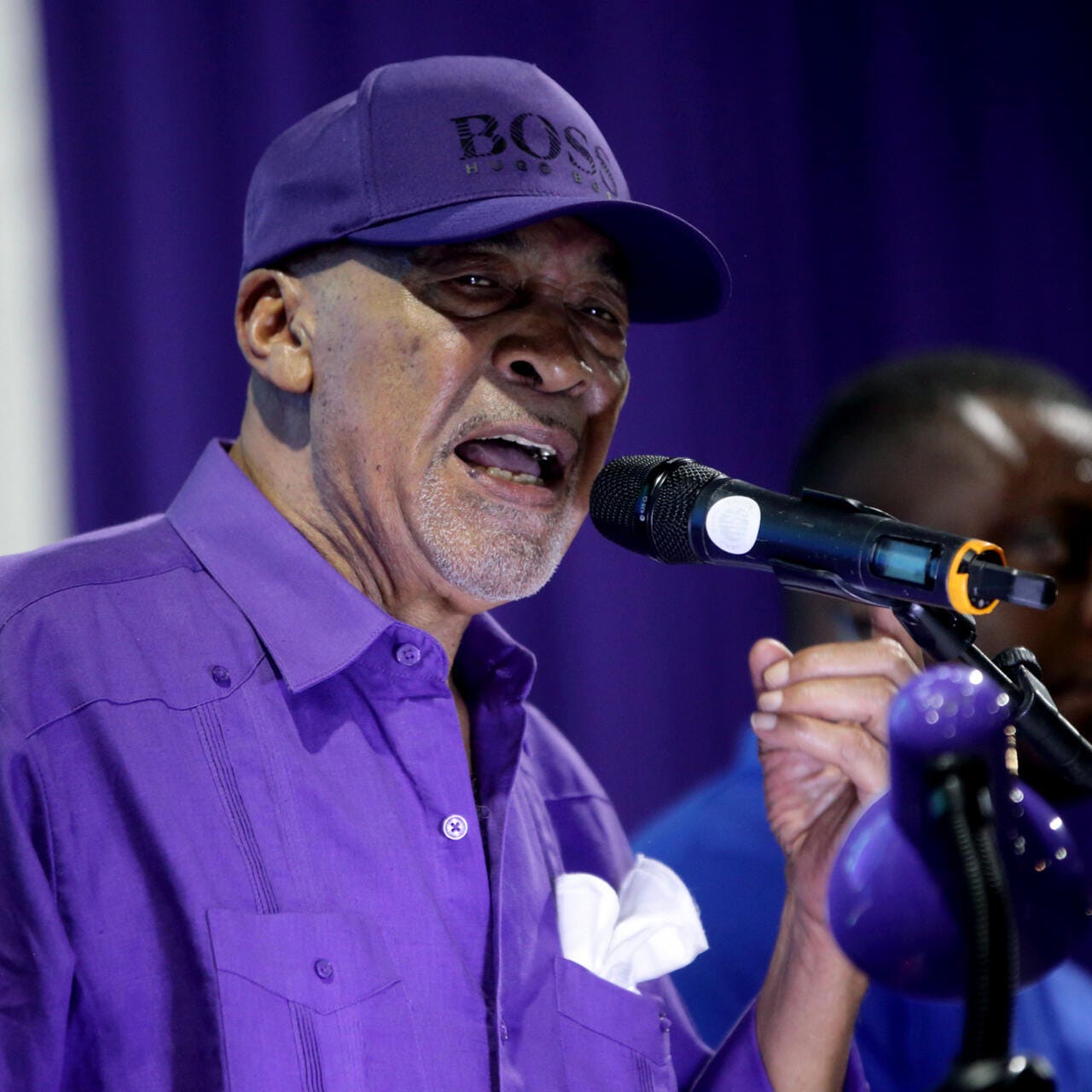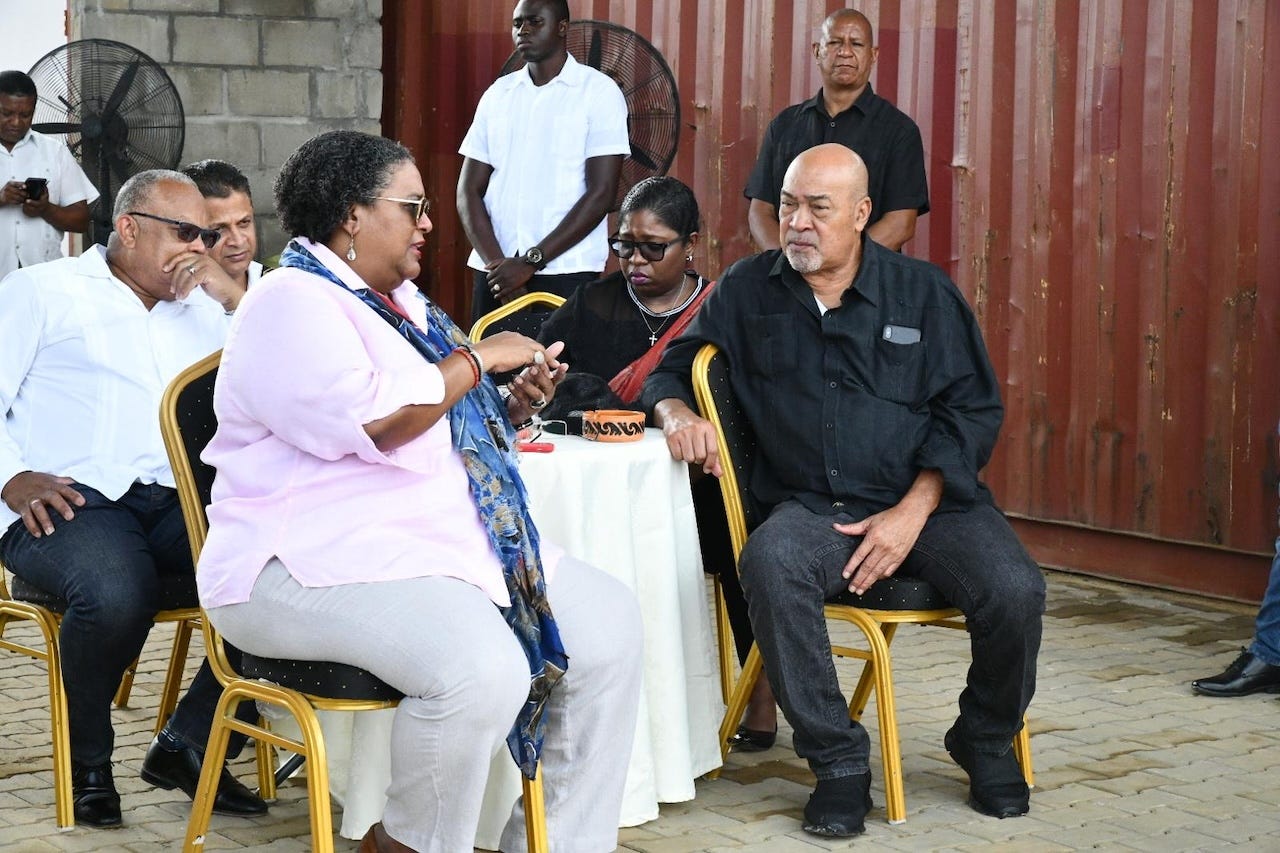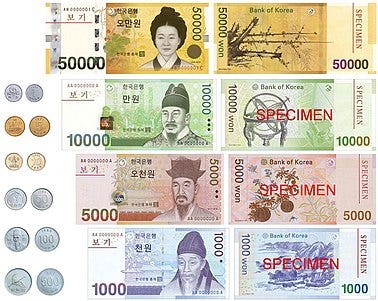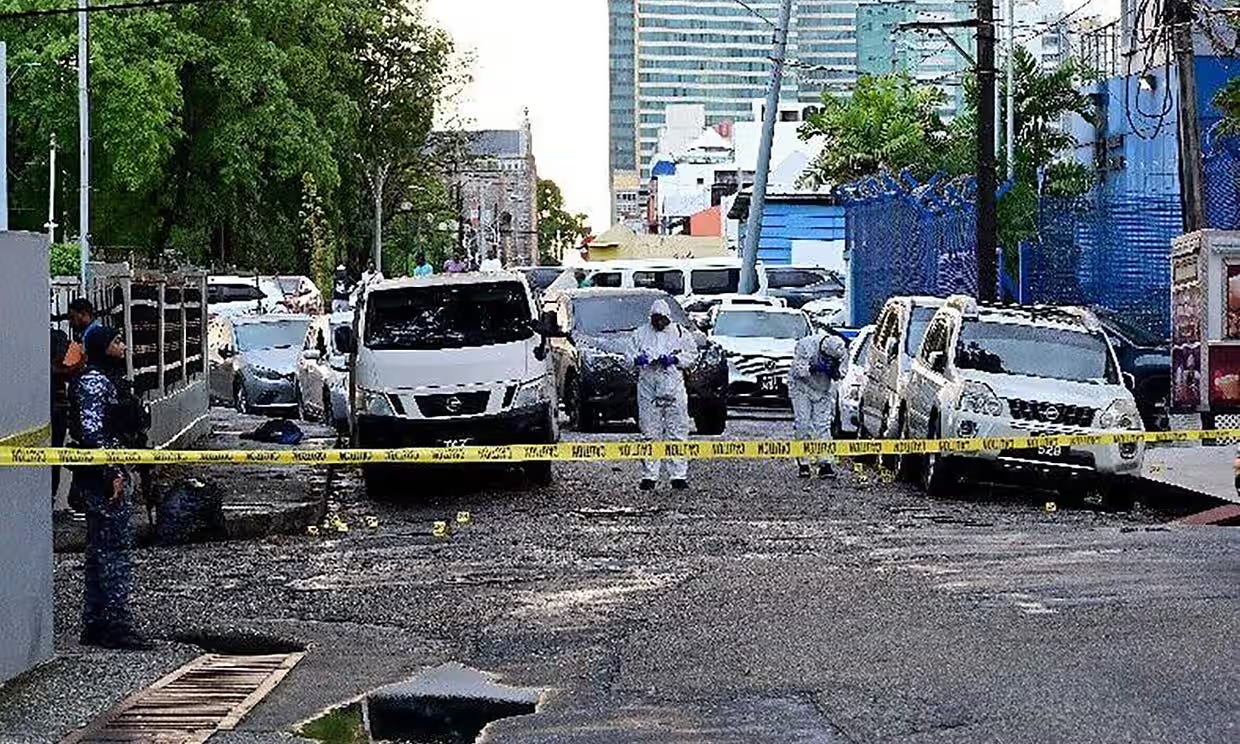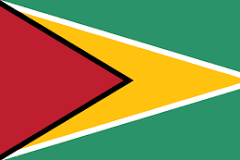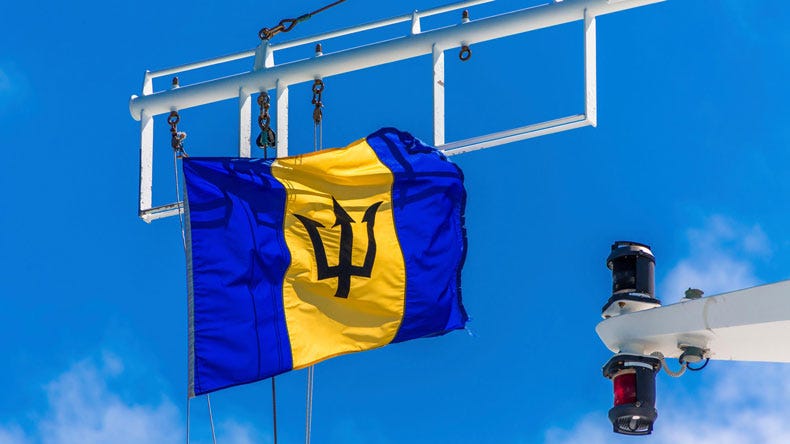Foreign affairs in a crazy, mixed up world
Updates: Suriname; South Korea; Trinidad, Guyana, and Syria
On Christmas Day, the fugitive ex-president of Suriname finally reappeared—by one report, mysteriously found dead at a bus stop—but the mystery of his year-long disappearance has only deepened. Desi Bouterse, 79, had been missing since failing to appear in court in January to begin his 20-year life sentence for murdering 15 opposition leaders decades ago, shortly after overthrowing the elected government in a 1980 military coup.
Exactly where he was for the missing year, what caused his death, and how his body appeared at the home of his wife, the former First Lady, on Christmas Eve, just days after the government had raided that home in search of him, are all questions that may not be easily answered soon, if ever. In the rather opaque world of Surinamese politics, wild rumors are often the only “facts” available, it seems.
Clad in party purple, former dictator Desi Bouterse is gone—but not soon forgotten. Courtesy Agence France Presse
It was just days, in fact, after the 42nd anniversary of those murders, which for their very brazenness, threw Surinamese society into a tailspin from which it has never quite recovered. One would not expect much public sympathy for the reviled ex-dictator, despite his laughable 10-year tenure as the country’s president—while making pitiful Suriname the laughingstock of the world’s democracies—but revisionists are apparently falling all over themselves to praise the man, as if he had somehow earned forgiveness for his long list of sins.
My personal favorite is the inexplicably charitable description of Bouterse by longtime Barbadian Prime Minister Mia Mottley, who sought to humanize the murderous old rascal as someone you would happily invite to a neighborhood barbecue:
“I have met many, many people in this job since I became Head of Government in May 2018. But there are some whose personality is so strong that they leave an indelible mark on all those with whom there has been interaction. Desi Bouterse was one such man. His was a history ranging from freedom fighter to Head of State of the Republic of Suriname. Whether you agree with him or not, you would have to appreciate the force of his personality. …
During my visits to Suriname, he took me all across the country, including the Brokopondo District, interacting with people from all walks of life in his unique way, whether it was to sing with the griots or to hug children who gathered around. … in July 2023 during the CARICOM Heads of Government Conference hosted by President Santokhi, I was privileged that Comrade Ralph [Gonsalves; PM of St. Vincent and the Grenadines] and I were able to meet Desi and spend time with him much of which was with laughter; but, alas, who knew that would be our last time together. May he rest in peace and rise in glory.”
Barbadian PM Mia Mottley with former Surinamese dictator Desi Bouterse. Public domain photo
One can excuse, perhaps, the rose-colored glasses of a leader who was still in high school when Desi Bouterse overthrew his own nearby government in 1980—and conveniently studying law in London when he ordered those 15 murders, and some say, held the gun himself. But as the newly-chosen chief of the same CARICOM conference she linked to her last sighting of Bouterse, Mia Mottley might have done far better, instead, to remember the quotation she posted to her social media account on X: “I was brought up in my father's home believing in democracy and trusting the will of the people.”
Perhaps she will, in time, regret her misguided error. For her friend Bouterse proved time and time again that he had no such respect for the spirit of democracy, dismissing the elected president by telephone, no less, in 1990. Whether he gave at least a fig for the trappings of it—wrapping himself and his wife in the purple party robes of public office by paying her out of public funds to emulate Eva Peron, after his party gained control of Parliament in 2010—is perhaps arguable, at least. He clearly remained popular among Suriname’s poorer classes for his extreme generosity with public funds—dispensed, as it were, from a bankrupt economy—while serving as president.
Suriname’s current president, Chan Santokhi, perhaps mindful of his own uncertain future in upcoming elections, was more nuanced, first issuing a polite statement on Christmas Day: “In anticipation of more detailed and definitive information from official channels, we would like to offer our condolences to the wife, children and other surviving relatives for this loss. … In the spirit of the holiday season and year-end, the president calls on all to remain dignified and calm, maintain peace and order and engage in prayer in the spirit of these special days,” the statement said.
Santokhi’s statement failed to mention, of course, that the country’s police had raided Mrs. Bouterse’s home the week before, after it was rumored that he might be hiding out there. Nor did it mention that one of Bouterse’s sons, Dino, is currently serving a 16-year sentence in U.S. federal prison, after pleading guilty to pleading guilty last August to charges that he tried to offer a home base in Suriname to the Lebanese paramilitary group Hezbollah.
Santokhi then waited several days before quietly announcing—on New Year’s Day, through his foreign minister, that “based on his powers and advice received, that there will be no state funeral … No period of national mourning,” according to the Jamaica Observer (see https://www.jamaicaobserver.com/2024/12/29/suriname-rules-state-funeral-ex-dictator-bouterse/ ).
Yet even Santokhi apparently feared alienating supporters of his predecessor too much—or allowing too much wiggle room to the current vice president, Ronnie Brunswijk, a former Bouterse bodyguard and ally. Brunswijk is expected to mount a serious challenge to Santokhi if Bouterse’s party, the NDP, wins control of Parliament in May elections, as expected.
Brunswijk ‘s posting on Facebook hinted as much: Bouterse’s “life had a lasting impact on our country and his efforts will not be forgotten.” And his party leaders are not far behind in their revisionist version of history.
Bouterse’s “legacy of hope, struggle, and perseverance will continue to guide us in our mission to build a stronger and fairer Suriname. He was a visionary leader who dedicated his life to the development of Suriname and the unity of our people. … he brought about historic changes for our country and people. … from 2010 to 2020, he led it with vision and determination, always fighting for the progress and unity of the Surinamese people. His most important mission was to combat poverty. He will always live on in the collective memory,” said party chairperson Jennifer Geerlings-Simons of the NDP, of which his widow, Ingrid, is a vice president—perhaps even a future successor if Brunswijk is discounted.
Like Mrs. Bouterse’s husband, the now-wealthy Mr. Brunswijk once had much less respect for democracy, waging a low-key, statemated civil war against the elected government in the late 1980s, after breaking with Bouterse, while I served at the U.S. Embassy in Paramaribo. Like his onetime mentor, Brunswijk can no longer travel to Europe, having been convicted in absentia of running a cocaine smuggling ring in both Dutch and French courts. He will doubtless not be welcome in the United States, either—although perhaps in Barbados.
Brunswijk has steadfastly denied any involvement in drug trafficking, claiming his fortune came instead from timber and gold-mining concessions he obtained after the war, according to the New York Times (“Guerrilla Leader, Drug Baron, Gold Magnate,” January 8, 2021, https://www.nytimes.com/2021/01/08/world/americas/ronnie-brunswijk-suriname.html ).
What will finally happen, of course, remains to be seen. Santokhi may still relent and permit a quiet state funeral for the country’s dishonored son—or supporters may stage their own mock funeral without the trappings of state. Many of them dared to gather outside his widow’s home en masse to pay their respects on Christmas Day, some reportedly garbed in the party-purple clothing often affected by Bouterse.
Has Desi Bouterse, in death, achieved the respectability that so often eluded him in life? The slow rush to somehow sanitize Bouterse’s blood-spattered legacy reminds me of the bit of movie dialogue uttered by an equally murderous fictional character, Noah Cross—and often misattributed to humorist Mark Twain—in Chinatown: “Politicians, ugly buildings, and whores all get respectable if they last long enough.”
Bouterse started that process of “reinventing” himself as respectable in 2010, although not everyone—including the country’s highest court—agreed. But “rest in peace and rise in glory?”
For my part, I think building a public stockade for displaying his wax-emulsified corpse, where those who spent decades fearing the cocaine-fueled wrath of someone so detestable as Desi Bouterse can throw rotten tomatoes—or better yet, burning bags of dog excrement—at him as long as they wish, is an eminently more suitable scenario.
* * * * * * *
South Korea, whose parliament recently impeached its elected president, Yoon Suk Yeol, for his ill-fated, six-hour declaration of martial law in early December, has now plunged even deeper into uncharted semi-democratic territory. Its highest court has issued an arrest warrant for the hapless politician, who faces an uncertain future at the hands of the country’s constitutional court as it prepares to weigh his fate. His supporters then gathered by the thousands outside his home to prevent execution of the warrant, issued because Yoon refused to cooperate with the investigation.
But the story had already taken an even more bizarre turn in late December when the acting president—Prime Minister Han Duck-soo—was then impeached for “intentionally avoiding the special investigation to probe those involved in the insurrection,” and “clearly stat[ing] his intention to reject the appointments of three Constitutional Court judges.” Such actions, said the parliamentary opposition, were “in violation of a public official's duty to uphold the law ... and serve the public.”
Han had unsuccessfully sought a compromise solution on the nominees he was asked to appoint. His replacement, Finance Minister Choi Sang-mok, will now step in as acting president, becoming the third man to hold the South Korean president’s position in less than a month. Soon they may have to advertise for takers.
The situation was provoked by Han’s refusal, on principle, to name three judges to vacant positions on the nine-member constitutional court, which will now decide Yoon’s fate—and risk either stacking the court against Yoon or helping acquit him. Han declared that as acting president, he did not have the constitutional authority to appoint any new justices, something only the elected president was allowed to do.
The game of musical chairs may continue indefinitely in the new year if Choi follows Han’s lead and declines to appoint those justices. Meanwhile, the six sitting judges face a statutory deadline to complete their trial of Yoon—and anything less than six “yes” votes—two-thirds of a full court— would automatically acquit Yoon.
Meanwhile, uncertainty over the political situation has threatened the stability of the South Korean economy, with the South Korean currency plunging to “1,480.2 [won] per U.S. dollar on Friday morning [December 27], marking its lowest level in nearly 16 years,” according to a recent Voice of America report.
The South Korean won’s value is being affected by the country’s political uncertainty. Public domain photo
The won was already at a two-year low against the dollar after the declaration of martial law as investors, already concerned about the state of Asia's number four economy, shunned the currency, said VOA.
Stay tuned for more shameless posturing by the power-drunk opposition in a key U.S. ally once generally regarded as a stable democracy, now lurching toward long-term chaos.
* * * * * *
Two small notes from oil-rich countries in the Caribbean caught my eye this week, a somber note from Trinidad and Tobago and another more puzzling one, concerning the illegal use of the Guyanese flag.
Just before New Year’s Eve, the government of Trinidad and Tobago—population 1.4 million—declared a state of emergency, empowering its military to make arrests and allows the authorities to enter suspects’ homes without warrants and deny them bail, following an alarming spike in murders and gang-inspired violence. But it did not impose a curfew, wary that its economy might suffer.
Trinidad is already among the most prosperous nations of the Caribbean, with the region’s “largest economy and the fifth-richest by GDP [gross domestic product] (PPP) [per capita]” in the Western Hemisphere, according to its Wikipedia entry. Its economy is primarily industrial, with an emphasis on petroleum and petrochemicals, based on its large oil reserves—second only to those of Guyana—and its exploitation of oil and natural gas. But its level of violence is extraordinarily high, with almost as many murders—625—as chaotic Haiti, with 11 million people, also beset by rampaging street gangs.
A December shooting scene in Port of Spain, Trinidad and Tobago. Photo courtesy Trinidad Express
The emergency declaration was followed within hours by the drive-by assassination of a special prosecutor, Randall Hector, on New Year’s Eve, shocking the nation’s judicial system and prompting a boycott by other prosecutors.
According to the New York Times, “The Caribbean nation has struggled with the presence of criminal groups for more than 25 years, but the past decade has seen a surge in the escalation of violence by street gangs,” including many of the 623 murders reported so far in 2024. [See “Trinidad and Tobago Declares State of Emergency,” December 30, https://www.nytimes.com/2024/12/30/world/americas/trinidad-and-tobago-emergency-crime.html .]
In July, the U.S. State Department renewed its somber Level 3 advice to U.S. travelers in Trinidad “to reconsider” visiting Trinidad “due to crime. Exercise increased caution in Trinidad and Tobago due to terrorism and kidnapping,” noting that “Violent crime, such as murder, robbery, assault, sexual assault, home invasion, and kidnapping is common.”
Meanwhile, Guyana, its neighbor to the south, is also experiencing rapid economic growth due to oil production. With a population just half the size of Trinidad’s, the long-poverty-stricken Guyana suddenly has a nearly-equivalent GDP per capita of nearly $20,000, a first-world level. But success sometimes breeds peculiar problems, including the unanticipated use of its country’s flag for illicit use by Middle Eastern criminals and terrorists.
An article in the Jamaica Gleaner reported that the United States had sanctioned a Syrian shipping conglomerate for illegally using the Guyanese flag to disguise at least four of its oil tankers, already under sanction for transporting Iranian oil. “The vessels were not registered in Guyana and, therefore, should not have been carrying Guyana's flag as the country of registration. … Guyana, through the Maritime Administration Department, operates a closed registry and therefore the registration of vessels under the flag of Guyana is limited to ships owned by Guyanese nationals, residents, citizens of CARICOM (Caribbean Community) states and corporate bodies established under the laws of Guyana.”
Guyana’s flag, allegedly used to disguise at least four oil tankers with Syrian and Iranian connections. Public domain
The Guyanese Ministry of Public Works “said none of the owners of the vessels sanctioned by the US fall into any of the listed categories.” [See “US sanctions Syrian conglomerate,” December 28, 2024, at https://jamaica-gleaner.com/article/caribbean/20241228/us-sanctions-syrian-conglomerate-using-guyanas-flag .]
In mid-November, the U.S. State Department had announced sanctions on “26 companies, individuals, and vessels associated with Al-Qatirji Co., a business alleged to be facilitating the sale of Iranian oil to Syria, where the company is based.” The company was accused of allegedly “facilitating the sale of fuel between Syria and the Islamic State of Iraq and Syria, or ISIS, by the Department of Treasury's Office of Foreign Asset Control [OFAC], which enforces U.S. sanctions.”
The Al-Qatirji company —sometimes spelled Al-Qatarji or Al-Qaterji—had earlier been sanctioned in 2018 for its reputed ties to the government of former President Bashar al-Assad, who was overthrown in December and fled to exile in Moscow. The status of the Al-Qatirji company since Bashar’s downfall is not clear, although it is unlikely that the new government will long tolerate its continued presence; business owners have doubtless fled the country, perhaps even to Moscow.
Despite ongoing sanctions and other efforts to thwart such actions, Iran's Islamic Revolutionary Guard Corps-Qods Force, or IRGC-QF—a U.S.-designated terrorist organization—allegedly generates billions in oil revenue to disperse to proxy groups, particularly Houthi rebels in Yemen. The vessels recently sanctioned for illegally using the Guyanese flag included the Ramona I, Chloe, Mia, and Lia vessels, all crude oil tankers, and one product tanker, the Baron [sometimes known as the Daran], all controlled, if not owned, by Al-Qatirji and among those already sanctioned as part of the larger November effort [see “US sanctions Syrian company,” November 14, https://www.spglobal.com/commodity-insights/en/news-research/latest-news/crude-oil/111424-us-sanctions-syrian-company-said-to-generate-revenue-for-iran-houthis ].
U.S. sanctions allow seizure of the vessels if they enter U.S. ports, but more significantly, can be extended against anyone who receives or deals with these vessels. Guyana may therefore be acting wisely to deny its flag to “dark fleet” shipowners; to its credit, it refuses to rent out its flag to vessels with no clear ties to Guyana or the region. But other countries are not so prudent.
Meanwhile, the possible implications of such sanctions are unclear for countries as Barbados—which has apparently actively registered at least two of the other sanctioned Al-Qatirji vessels, the Eline and Lelia—or Panama, which has allowed its flag to fly over two more, the Celine and the Rex 1. And Barbados and Panama are not alone, sadly. Both could face significant damage to their reputations, or worse.
But the truth is that the lucrative practice of flag-hopping by the so-called “dark fleet” has become so pervasive that it is almost impossible to determine with certainty who actually owns a ship these days, and a money-hungry country can often just turn a blind eye. In most cases, the flagging country simply makes money from registering a vessel, and has nothing to do with its ownership or operation—although common sense should alert a reasonably wary country to deny the application in truly dubious cases. Still, money talks—and more than a dozen countries are rushing to flag any vessel that appears with application in hand, including African countries and at least one former U.S.-governed territory, Palau.
Despite its protest in 2023, Barbados reportedly has allowed a large number of questionable vessels to sail under its flag in recent years, including nearly half of the ships currently sanctioned by the United Kingdom, its former Commonwealth mistress, according to one report. Now a bona fide republic, without the British monarch at its helm, it proudly touts its flag registry as the fastest-growing in the world.
Barbados was caught up in a similar reflagging incident in 2022, when the United States sanctioned the Young Yong vessel, which had been renamed the VLCC Saint Light. It was reflagged in Barbados after it ran aground in Indonesia in October, and Djibouti purposely deflagged it. Barbados insisted in January 2023 that it would not knowingly register such a ship and would remove it “if class certification cannot be provided.” [see “Barbados defends reflagging US-sanctioned tanker,” January 2023, https://www.lloydslist.com/LL1143766/Barbados-defends-flagging-US-sanctioned-tanker ].
The Saint Light’s current status is not known, although it may have been deflagged by Barbados, and since renamed the Stellar Oracle—and may now even be flying the false flag of Guyana, according to the Marine Vessel Traffic website [see https://www.marinevesseltraffic.com/ship-owner-manager-ism-data/STELLAR-ORACLE/9194127/314717000 ]—or may have been scrapped. No one knows for sure.
The Barbados flag flies aboard an increasing number of world sea vessels. Public domain image
Another Lloyds List report lists Barbados as “among a dozen smaller registries targeted by the so-called dark fleet, which has grown to 300-plus vessels now deployed in sanctioned oil trades shipping more than 2m barrels per day of crude from Iran, Venezuela and Russia. They take their name from switching off their automatic identification system transponders that transmit their location in order to hide movements related to loading and transferring sanctioned oil, a practice known as ‘going dark.’” [See “Barbados flag targeted by dark fleet owners shipping sanctioned crude,” https://www.lloydslist.com/LL1143592/Barbados-flag-targeted-by-dark-fleet-owners-shipping-sanctioned-crude .]
Taking money for flagging a “dark fleet” vessel is risky. Barbados might do well to emulate its fellow CARICOM member, Guyana, by restricting its flag to ships with credible ties to the region. Doing otherwise will eventually begin to strain its relationships with the United States and the United Kingdom, a fact which should be painfully aware to Mia Mottley as she eyes her own future—perhaps as the first woman to be secretary general of the United Nations.
Until then, if you desire a lot more detail on the murky world of the dark fleet—and the even more bizarre practice of “fake” ship demolitions—try plowing through Robin des Bois’ detailed article [see “Shipbreaking,” June 2023, https://robindesbois.org/wp-content/uploads/shipbreaking69.pdf ].
Next time: Thoughts on presidential administrations as family history markers




